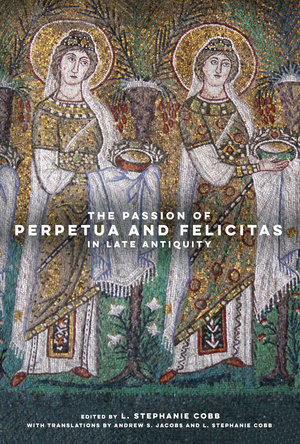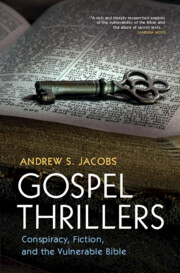
I
am a historian of early Christianity and religious cultures of
late antiquity. I have taught at the University
of California, Riverside; Scripps
College; Boston
University; and at Harvard
Divinity School where I was a Senior Fellow at
the Center
for the Study of World Religions.
I
am currently an Advising
Fellow and lecturer in the Engagements
program at the University of Virginia.
On this site you can find information about my publications, teaching, and ongoing research.
You
can contact me at: andrew [at] andrewjacobs [dot] org You
can find me on BluesSky: @drewjakeprof.bsky.social You
can find me on Instagram: @drewjakeprof You
can find me at the Humanities Commons: https://hcommons.org/members/drewjake/  PUBLICATIONS The Life of Thecla: Apocryphal Expansion in Late Antiquity, Westar Tools and Translations (Cascade Press, 2024) (purchase link): more info and preview here
Gospel Thrillers:
Conspiracy, Fiction, and the Vulnerable Bible (Cambridge
University Press, 2023)
(purchase
link); and visit the companion website
here.
 Epiphanius of Cyprus: A Cultural Biography of Late Antiquity, Christianity in Late Antiquity (University of California Press, 2016) (purchase link) WINNER: 2017 Philip Schaff Prize from the American Society of Church History  Christ Circumcised: A Study in Early Christian History and Difference, Divinations (University of Pennsylvania Press, 2012) (purchase link)  Remains of the Jews: The Holy Land and Christian Empire in Late Antiquity, Divinations (Stanford University Press, 2004) (purchase link)  Christianity in Late Antiquity, 300-450 CE: A Reader, co-edited with Bart D. Ehrman (Oxford University Press, 2003) (purchase link)  The Passion of Perpetua and Felicitas in Late Antiquity, ed. L. Stephanie Cobb with translations by L. Stephanie Cobb and Andrew S. Jacobs (University of California Press, 2021) (purchase link) For other works, click on the Humanities Commons link above; for my complete curriculum vitae, click here.  CURRENT RESEARCHEx-Jews: Conversion in Late AntiquityThis study explores narratives of Jews converting to Christianity in the first seven Christian centuries to ask how and why “conversion” becomes a distinctive way of understanding religious identities and boundaries, for ancients and for modern scholars. Engaging with a variety of literary and social genres—law, hagiography, history, dialogues, sermons, and letters—this book argues that particular shifts in the way the human person came to be defined—in terms of the will, the self, and the very notion of "identity"—made possible something called "religion" as a discrete and bounded category, maintained and policed through narratives of conversion. In the context of a Christian Roman empire, the conversion of Jews became a paradigmatic site for imagining these new ways of being.Elements:
Religion in Late Antiquity (editor)
This
series from Cambridge University Press takes a holistic
and comparative approach to what is typically categorized as
“religion” in roughly 100–800 C.E. throughout the Mediterranean
and Near East. Individual volumes, ca. 20,000–30,000 words in
length, will address one of three major categories of topics:
Frameworks (modern and ancient); Sources (texts, objects, and
spaces); and People (authorities and outsiders). They will serve
as points of entry on an array of topics for students and
scholars of late ancient religious worlds at all levels.
Ideally, they will also advance the higher-order questions and
debates that have emerged from the broadening of horizons in the
study of late antiquity in recent years. Volumes will aim to
identify the particular themes that characterize religion in
late antiquity and will often cross traditional disciplinary
lines. The series will, thus, be composed of contributions from
classical studies, Early Christianity, Judaism, and Islam, among
other fields. Collaborative volumes by scholars who work in
different fields are therefore especially encouraged. Published
online and available as print-on-demand paperbacks, the series
can accommodate graphic elements such as images, charts, and
tables. |


